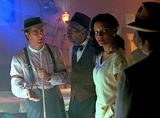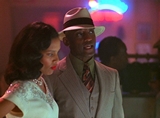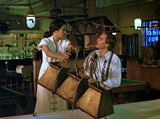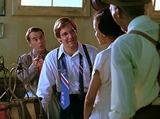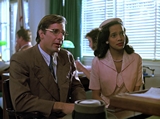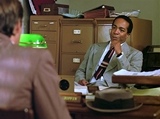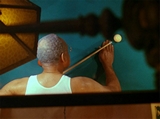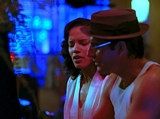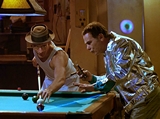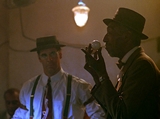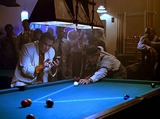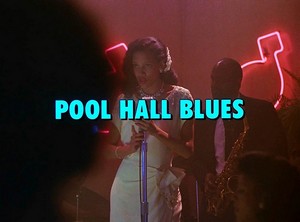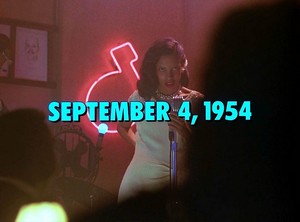| Screencaps Click to enlarge |
2x18 "Pool Hall Blues" | |||||||||
 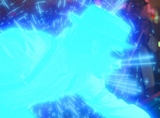   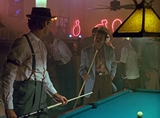  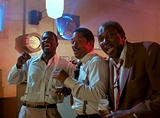    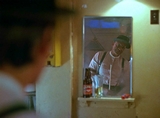
 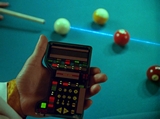  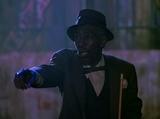  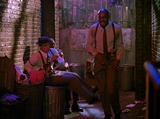 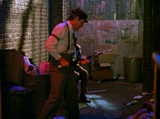  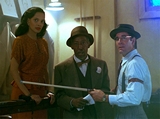   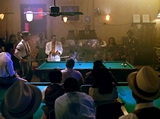 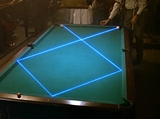  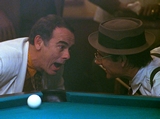 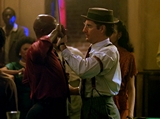 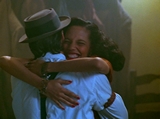     |
. . |
|||||||||
|
Leap
Date: |
||||||||||
|
||||||||||
| Episode
Menu |
||||||||||
|
TV
Guide Synopsis |
||||||||||
| Production # 65422 | ||||||||||
| TV Guide Teaser: Sam picks up the cue of a 1950s Chicago pool shark, and finds himself committed to a game that will determine his granddaughter's future. Violet: Shari Headley. Eddie: J.W. Smith. Grady: Teddy Wilson. The Brush: Ken Foree. Sam: Scott Bakula. |
||||||||||
| Chicago, Illinois, USA | ||||||||||
| Leap
Date: September 4, 1954 - Saturday |
||||||||||
| Leapee: Charlie “Black Magic” Walters |
||||||||||
|
Broadcast
Date: |
||||||||||
|
Suddenly, an old man named Jimmy Grady (played by Teddy Wilson) starts laughing and approaches the table. He asks Lester if he knows who he's actually playing, then introduces Sam as Charlie "Black Magic" Walters, the greatest pool player in the world. Sam's granddaughter, Violet, who owns the nightclub, is watching from across the room as she sings onstage. She walks over to the table and tells Sam to give Lester his money back, but Lester claims he can still beat Sam and raises his bet to five hundred dollars. Sam daringly asks Lester if he really wants to lose his money. Lester backs down, and Grady gives the money back to him. Lester apologizes to Sam, and eagerly shakes his hand. Eddie approaches Sam about playing a game against him, and Violet tells Eddie to beat it. Eddie reminds her that he owns the marker to Violet's club, which is due in two days, and compliments her on turning the pool hall into a classy uptown establishment. He tells her it will be a pleasure owning the club, and leaves with a laugh. Grady assures Violet that Sam will never let Eddie take over her club. Al arrives, and marvels at the pool cue Sam is holding, referring to it as "Alberta" and telling Sam that Alberta is Magic's trademark stick. Grady takes Alberta and puts her away, and Sam directs Al to the men's room so they can talk privately. In the men's room, Sam looks at Magic's reflection, and Al says he hadn't seen Magic in over forty years before he recognized him in the waiting room. He tells Sam that he once held Alberta, which only a few people have ever done, and explains his friendship with Magic. When Al was ten, he ran away from the orphanage, and after a few days on his own, got so desperate he tried to rob someone in the street. That someone turned out to be Magic, who took Al in, fed him and gave him a jacket. Al traveled with Magic until Magic was arrested in New Orleans for playing in a whites-only pool hall and Al wound up back in the orphanage. Despite this, Al has never forgotten what Magic did for him, and tells Sam he has to help Magic now. Sam promises to help Magic, but Al explains that their problem is Eddie. Violet borrowed some money so she could turn the pool hall into a blues club, and Eddie bought her marker, which he wants to put up for wager so he can get a game against Magic. Sam insists that he doesn't know how to play pool, but Al tells him he'll have to learn, or else Violet will lose her club and Al will never forgive himself for not helping Magic. The next morning, Sam finds Violet replacing the lamp above Magic's trademark pool table. Grady arrives, and insists that the old lamp should stay there. Sam convinces Violet to let the old lamp stay, much to Grady's relief. Sam then suggests to Violet, Grady and Al that if they can go to a bank and get a loan, Violet can buy back Eddie's marker. All three of them are skeptical about being approved for a loan, especially since Violet is black and a woman. Violet tells Sam that they already tried applying for a loan and failed, but Sam argues that trying again still makes more sense than risking everything over a game of pool. At the bank, Sam and Violet enter and ask about applying for a loan. The receptionist tries to pretend that all of the unoccupied loan officers are busy, then refers them to Charles Griffin (played by Robert Gossett), the bank's only black employee. Charles is sympathetic to their request, but explains that establishments such as pool halls and blues clubs are not sound investments. Violet explains that she needs to pay back the money she borrowed from Eddie since her previous attempts to apply for a loan were refused. Charles tells them about the indignities he has suffered being the first black man to work at the bank, then loudly refuses their application. Sam and Violet leave in frustration and anger. Sam tells Violet that they can go to another bank, but Violet responds that they won't be able to find a bank that will approve a loan for them before tomorrow. She now plans to exploit Eddie's sexual interest in her instead, telling Sam that it's the only way to hold on to her club and her dream. That night, Eddie is in the club playing pool when a provocatively dressed Violet approaches him. She openly flirts with him, and Eddie questions her sudden interest. Grady finds Sam and warns him about what Violet is doing. Sam interjects himself between Eddie and Violet, and tells Eddie to stay away from her. Eddie suspects that Violet only approached him because Sam was afraid to play him, but Sam says they'll play tomorrow, when the marker is due. Later that night, Sam is practicing at Magic's table while Violet is singing and playing piano. Al assures Sam that since he learnt how to play pool from Magic, he can teach Sam how to play and beat Eddie. Violet asks Sam to join her at the piano, and the two of them sing together as Sam plays the piano to a smiling, astonished Violet. She tells Sam that he'll never cease to amaze her. Sam says goodnight to Violet, then goes back to the pool table. Al tells him that he needs to learn the geometry of the table, then he can learn where and how hard to hit the ball. Sam guesses that it takes a long time to learn, then the two of them realize that Al can use the handlink to guide him. Al punches some commands into the handlink, and a thin blue light appears, giving Sam a path to sink the next ball, which he successfully does. The following night, a large crowd has gathered in the club to watch the game, and bets are being taken. Eddie is waiting at the table with a cocky smile as Sam arrives with Violet by his side. Al is also there, handlink at the ready, and a large man called The Brush (played by Ken Foree) is accompanying Eddie. Grady pulls the sheet off of Magic's table, and Eddie finds the table has already been racked for nineball, which is Magic's game of choice. Sam shoots first with the handlink guiding him, and immediately sinks the nine-ball off the break, winning the first game. The game continues, with Sam and Eddie both playing confidently. Sam is preparing for a shot when the light from the handlink starts to fail. Al tells Sam he'll have to stall, because the Pentagon is usurping the project's power supply. He leaves to try and work on the problem, and Sam pretends to study the table for a few moments, then tells Eddie he needs to take a break. Eddie agrees to let Sam have five minutes, and Grady offers to look after Alberta. Sam walks away, and Eddie tells The Brush to do something about Alberta. Grady is polishing Alberta when The Brush tells him that Magic wants to see him outside in the alley. Outside, Grady sees nobody but The Brush, and realizes he has been set up. The Brush punches Grady in the stomach, and Sam hears the commotion from the men's room. He runs outside to check on Grady, and The Brush breaks Alberta over his knee, snapping her in two. He tosses Sam one of the broken pieces, but Sam uses it to attack The Brush and knock him to the ground. Sam and Grady come back inside, and Sam tells Grady to find him another stick. Grady brings him a stick, and tells him the stick is called Basheeba. Sam approaches the table again, making a show of getting used to holding Basheeba as he continues to stall. As Sam finally prepares to shoot, the blue light from the handlink re-appears. Sam looks up to see that Al has returned, and Al tells him to shoot quickly, because he only has two more minutes of power. Sam sinks the nineball, winning the game and evening the score at six games each. Grady racks the balls for the final game as Sam prepares to break. He sinks two balls from the break, and Eddie looks worried. Eventually, only the nine-ball is remaining at a difficult angle. Sam prepares to shoot when the light from the handlink fails again. Al realizes that this time, the power from the handlink is gone for good. After a few nervous moments, Sam leans over the table with deep focus, and makes a shot, sinking the nine-ball and winning the game. Violet approaches an angry Eddie and asks for her marker back. Eddie looks around at the crowd of people watching him, then gives it to her. Violet tells him she doesn't want to see him in her club again, and Eddie lunges at her. Sam steps between them, holding Eddie back. Eddie and The Brush leave, and Violet hugs Sam. She starts to tell him again that he'll never cease to amaze her, and as Sam finishes the sentence for her, he suddenly leaps. Source
|
||||||||||
|
“Stormy
Weather” Written
by: Harold Arlen / Sung by: Shari Headley "Baby I Don’t Cry Over You" by Billie Holiday "Confessin’ the Blues" by Walter Brown with Jay McShann’s Band "Spiritual Song" played by Scott Bakula. Written by Deborah Pratt.
|
||||||||||
|
Al
says he saw Magic in the Waiting Room. This appears to be the first
episode where some technology has changed, thus allowing Al to see the
Leapee instead of Sam's aura in the Waiting Room. However, Bellisario
(when questioned) said it must have been because Al saw Magic in a
mirror. At this point in the series, they hadn't worked it all out
completely.
Al is not seen going into or coming out of the IC in this episode. You
hear the door open
and close once. |
||||||||||
|
Scott
liked the shows he
would get to sing and play an instrument in. |
||||||||||
|
In
this episode Al is
wearing 2 gold rings, one on his right hand on the ring finger and the
other on his left hand on the pinkie finger. He also has a watch on his
left wrist; it has a gold bezel and a round face with a black band. |
||||||||||
|
1)
Olive green, rust
& brown printed southwestern shirt, black and green vest w/sm
white
dots, metallic greeen thin tie, dark colored pants, belt
w/silver
buckle (matches tie).
2) Gray print shirt, red
tie, gray
&
Wedgwood blue print suspenders, gray pants. 3)
Silver metallic
jacket, satin turquoise shirt, Silver metallic scarf type tie w/gray
diamond design, silver pants w/black belt
& silver buckle. 4) White linen suit, orange colored shirt, scarf type tie w/ metallic gold design, brown belt & brown shoes. |
||||||||||
|
Al
popped in and out 4
times. Al
smoked 3 cigars. Dean does play billiards quite well. Both Dean & Scott have played together.
The alley was built on the stage to save on production costs.
|
||||||||||
| Bloopers:
|
||||||||||
|
Regular Cast: Scott Bakula as Dr. Samuel Beckett Dean Stockwell as Admiral Albert "Al" Calavicci Deborah Pratt as Narrator |
||||||||||
|
Ken Foree as The Brush Robert
Gossett as Charles
Griffin J.W. Smith as Eddie Davies Annie Waterman as Miss White Teddy Wilson as Jimmy Grady Alton
Blair Carter as Lester Brown |
||||||||||
|
Ken Foree as The Brush: Large, likable, and muscular actor Ken Foree was born as Kentotis Alvin Foree on February 29, 1948, in Indianapolis, Indiana. Foree attended Loyola University in Chicago and studied acting at Michael Shulman's Performing Gallery in New York City. He began his career in off-Broadway theater and worked as an assistant manager at a restaurant in Greenwich Village, in order to keep himself afloat during his salad days. Ken made his film debut in The Bingo Long Traveling All-Stars & Motor Kings (1976). He has since amassed a substantial array of often strong and commanding characters on either side of the law in both movies and television, alike. Foree gave a fine and impressive performance as tough swat team officer, "Peter Washington", in George A. Romero's Dawn of the Dead (1978). He also had a sizable supporting part in Romero's offbeat follow-up feature, Knightriders (1981). Ken was marvelously engaging as affable cop, Buford "Bubba" Brownlee, in Stuart Gordon's From Beyond (1986) and was, once again, solid as rugged survivalist "Benny" in Leatherface: Texas Chainsaw Massacre III (1990). Foree portrayed hard-nosed police officers in such pictures as The Dentist (1996), Sleepstalker (1995), True Blood (1989) and Terror Squad (1987). He had a cameo as a stern televangelist in the Dawn of the Dead (2004) remake by Zack Snyder. More recently, Ken had a terrific role as super mack daddy pimp, "Charlie Altamont", in The Devil's Rejects (2005) and made a brief-yet-memorable appearance as rough-n-tumble truck driver, "Big Joe Grizzley", in the remake of Halloween (2007) by Rob Zombie. Foree showed a softer and more sensitive side as "Roger Rockmore" on the hit Nickelodeon TV series, Kenan & Kel (1996). He also played a recurring part on the popular daytime soap opera General Hospital (1963). Among the TV shows on which Ken has done guest spots are Due South (1994), The X-Files (1993), Babylon 5 (1993), Matlock (1986), Dallas (1978), Cheers (1982), Quantum Leap (1989), Hunter (1984), Beauty and the Beast (1987), Moonlighting (1985), Knight Rider (1982), The Fall Guy (1981), Benson (1979), The A-Team (1983), Hill Street Blues (1981), The Dukes of Hazzard (1979) and Kojak (1973). His hobbies include surfing, boxing, weightlifting and watching basketball. In addition, Foree enjoys history and traveling. Ken Foree lives in Los Angeles.
Robert Gossett as Charles Griffin: Robert Gossett is a veteran actor of stage, screen and television. He is known for his work on The Oath, Greenleaf, Chicago Med and the hit TNT drama "The Closer" (2005-2012) and its spin off "Major Crimes (2012-2017). Among his many film credits are "Arlington Road" (1999) , "The Net" (1995) and "White Man's Burden" (1995). He is the father of four wonderful children.
Barack Obama for her ongoing community service as well as her support of the Boys and Girls Club of America.
J.W. Smith as Eddie Davies: J.W. Smith is a producer and actor with more than 40 years of entertainment experience in motion pictures and television. J.W. grew up in Cleveland, Ohio, where he began his acting career at The Karamu House Community Theater. In the early 1970s, J.W. moved to New York City where he became a student in Uta Hagen's acting class at HB Studio and at The Henry Street Playhouse. During his stint in New York City, J.W. met and became close friends with Morgan Freeman and Bill Duke. More than four decades later, J.W. remains close friends with both Morgan and Bill, often collaborating on scripts and potential projects. J.W. spent several successful years performing on Broadway and Off Broadway in plays including, "We Interrupt This Program," Public Theater's production of "On the Goddam Lock-in," and "So Nice, They Named It Twice." In addition to acting, J.W. produced shows in and around New York City for the Amas Repertory Theater Company. In the early 1980s, J.W. moved to Los Angeles to pursue an acting career in film and television where he immediately landed his first job in television on "Palmerstown, U.S.A." He was selected to be a part of Paramount Pictures Associate Producers Training Program, working on several ground-breaking series for television including, "The Best of The West," "Taxi," and "Cheers." J.W. has also appeared in numerous television shows including, "L.A. Law," "Cagney and Lacey," "Reno 911," "The X-Files," and "Hill Street Blues." Showing his range and depth of talent, J.W. has appeared in many popular feature films including, "Red Heat" (starring Arnold Schwarzenegger), "Johnny Handsome" (starring Mickey Rourke, Ellen Barkin, and Morgan Freeman), "Undisputed" (starring Wesley Snipes and Ving Rhames), "Beetlejuice" (starring Michael Keaton), "Hoodlum" (starring Laurence Fishburne, Tim Roth, and directed by Bill Duke), "The Warriors" (cult classic directed by Walter Hill), to name a few. J.W. is President of 3000 Realms Entertainment, a production company he co-founded with friend and business partner, Bryan Behuniak. J.W.'s project in development with 3000 Realms Entertainment is "Dead Wrong," executive produced by Morgan Freeman, with producers Bryan Behuniak, James Dyer, and writer Matt Benjamin.
Annie Waterman as Miss White: Annie Waterman is known for Say Anything (1989), Chaplin (1992) and Doctor Mabuse: Etiopomar (2014).
Teddy Wilson as Jimmy Grady: Teddy Wilson was born on December 10, 1943 in New York City, New York, USA. He was an actor and writer, known for Good Times (1974), Blood In, Blood Out (1993) and Life Stinks (1991). He was married to Joan Pringle. He died on July 21, 1991 in Los Angeles, California, USA.
His ‘Soft Hustle’ Is a Living for Rags Woods, 64 : Sweet Stroke Etches Pool Hall Legend
By MILES CORWIN |
||||||||||
| Guests
who
appeared in
other Quantum Leap episodes: Teddy Wilson also played Ernie Tyler in "Rebel Without a Clue." |
||||||||||
|
Say
What?
You can see Scott Bakula's shoulder in the mirror shot alongside Walters.
During
the "Stormy Weather" song, the clock doesn't change time
(8:50pm).
In
another mirror shot, Walters is using a different arm than Sam to
practice pool.
Sweat
stains in
the warm climate move around, disappear, and reappear on various actors
(including Sam) throughout the episode.
It's unclear why the Pentagon would take power from the Project at this particular time. Budget issues? Also, the Pentagon is in Washington, D.C. and PQL is in New Mexico, so why would they need that power anyway? |
||||||||||
|
Sayin'
ain't doin'. -- Grady, "Pool Hall Blues" Pythagoras, we are gonna' shoot some pool. -- Sam, "Pool Hall Blues" Pythagoras- we are gonna shoot some pool! -- Sam, "Pool Hall Blues" Magic, have you been eating onions again? -- just about everybody!, "Pool Hall Blues" Awwwww Sam ... not the head again, every time we leap in we gotta go talk in the men's room ... it's disgusting! Can you think of a better place to talk? ... The ladies room? -- Al and Sam, "Pool Hall Blues" I couldn't shoot a game of pool with a shotgun. -- Sam, "Pool Hall Blues" Grady
says,
“Magic … Magic no banks gonna give no ah … no loan to a woman.” Violet
says,
“Especially a Negro women.” Sam
says,
“All I see is a business person with a going concern who needs a loan.” Violet
says,
“Business person! Poppy you been sneaking onions again? You know how
they make you crazy!” (in
the bank) Sam
says,
“Now that the club is happening.” Charles
Griffin
says, “Happening?” Sam says, “ Working, making money…” |
||||||||||
|
Best Lines: ::Sam and Violet end their duet at the piano and she goes to bed and Sam walks over to Al::
Violet says, “Poppy if I live to be a hundred you’ll never cease to amaze me.” She gives him a kiss on the cheek. “I love you.”
Sam says, “Night, Night.”
Al says, “Ah… Gee that was kinda nice, Sam.”
Sam says, “Yah, it was. Okay now, what do I have to learn next?”
Al says, “Geometry.”
Sam says, “Geometry?”
Al says, “The geometry of the table. You can’t sink a ball until you’ve worked out the angles, epically on the… the bank shots!”
Sam says, “The angle of incidence equals the angle of reflection!” Al says, “Somethin’ like that.”
Sam says, “YAH!”
Al says, “Yah, and once you worked out the angles, then all you have to know where to hit the cue ball and how hard.”
Sam says, “It probably takes a long time to learn?”
Al says, “Takes years! Wish there was some way… I could draw it out for you …” As Al reaches into his pocket and pulls out the hand link. Pushing a couple buttons, you see a laser beam of light from the cue ball to the object ball to the cushion to the pocket. Al chuckles, “Huh-huh-huh-huh-huh-huh … Now … just hit the dot on the cue ball … nice and smooth … your elbows are hinged … medium strong … go for it … Oh what a pretty sound!”
Sam laughs as he pockets the ball, “Ha-ha-ha-ha-ha … Pythagorus! We are going to shoot some pool!” |
||||||||||
|
::in the bathroom:: Sam says, “Al! Everybody thinks I’m some kind of a… a pool giant.” Al says, “Well you are. You’re Charlie Black Magic Walters.” Sam says, “I never heard of him.” Al says, “Man, when I walked into that waiting room and saw him sitting there I couldn’t believe it! I never I’d thought see Magic again. It’s been over forty years since I last saw him.” Sam says, “You know him?” Al says, “Know him! I’ve held Alberta. There’s maybe 5 people in the world that can say that. I’ve even used her to sink a ball!” Sam says, “Al, I’ve never seen you so excited about anything. I mean this is just a pool cue. It’s not like it’s a woman.” Al says, “Ok, when I was ten years old I ran away from the orphanage. After a couple of days I was cold, I was scared, I was lonely. I got so desperate I even tried to pick a guys pocket.” Sam says, “Black Magic’s?” Al says, “Right! Now he didn’t turn me into the cops. He fed me, he bought me a jacket. He said to me er… that kids shouldn’t be in orphanages. That a kid should be raised by a family and I should travel with him until we could find one. Well I did! We drifted around together… we went to Chi, went to St Loui, went to the Big Easy. Where… he got busted for shooting pool in a “whites only” pool hall.” Sam says, “And you ended up back in the orphanage.” Al says, “It wasn’t his fault.” Sam says, “I wasn’t implying that it was.” Al says, “I… I’m sorry Sam it’s just that those few months were real important in my life. He turned me around, that old guy, showed me that there were people in the world that really care. And that’s why you gotta help him Sam!” Sam says, “Al! I’m gonna help him!” Al says, “But the only problem is… Eddie Davis… a slime ball pool shark that… magic has never played… because, well he doesn’t shoot pool with trash.” Sam says, “Eddie implied that I… that Magic has a game with him.” Al says, “Well… Violet borrowed some money from a loan shark… she was going to change this old pool hall into a blues club, and Eddie bought her marker and that’s what he’s putting up to make this match with magic.” Sam says, “That’s an expensive way to get a pool game.” Al says, “Well it is if you loose, but Eddie doesn’t figure to loose. See he knows that Magic’s eyesight is gone. But what he doesn’t know… is your eyesight is twenty-twenty!” Sam says, “Al look, my eyes may be fine, but I… I couldn’t shoot a game of pool with a shotgun!” Al says, “Well you’re gonna have to learn! Or else Violets dream is lost and Magic won’t ever forgive himself for not coming through for his granddaughter, and I’ll never forgive myself for not coming through for magic!” |
||||||||||
|
Winner:
Emmy for
Outstanding Cinematography for a Series in 1990: Michael Watkins
Nomination:
American
Society of Cinematographers Award for Outstanding |
||||||||||
|
Music by: Mike Post Panaflex ® Camera and Lenses by:
Panavision ® |
||||||||||
|
In the twenty-sixth installment of The Quantum Leap Podcast, Albie and Heather discuss season two, episode eighteen “Pool Hall Blues”. There are first impressions, an episode recap, thoughts and opinions, listener feedback, and a great interview with Shari Headley, who played Violet Waters in Pool Hall Blues. Also an article from Hayden McQueenie about Pool Hall Blues, and a chat with Heather and Albie about the holidays. 00:00:00 – QLP opening 00:02:45 – Hello – First impressions 00:04:42 – Episode recap 00:13:40 – Main discussion/Episode breakdown 00:56:50 – Interview with Shari Headley 01:34:29 – The Signal promo 01:35:31 – Family Guy clip 01:36:15 – He’ll Be There 01:38:17 – Interview reactions 01:39:05 – Off Topic Holiday Chitchat 01:44:34 – What leapers got for the holidays 01:46:08 – Feedback 02:07:23 – Hayden McQueenie segment 02:14:31 – Trivia 02:18:08 – On the next episode 02:20:00 – Goodbye 02:21:19 – Credits 02:22:32 – Bloopers 02:23:24 – PS Let us know what you think… Leave us a voicemail by calling (707)847-6682. Send in your thoughts, theories and feedback, Send MP3s & Email to quantumleappodcast@gmail.com. Also join us on Facebook.com/QuantumLeapPodcast and Twitter.com/QuantumLeapPod |
||||||||||
| Back to top | ||||||||||
|
||||||||||
